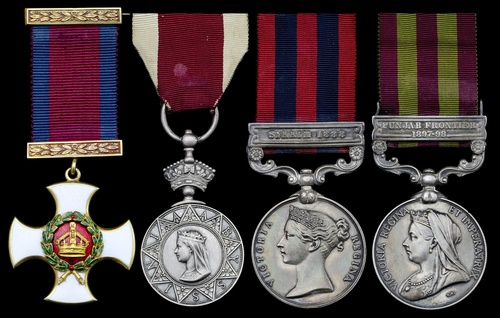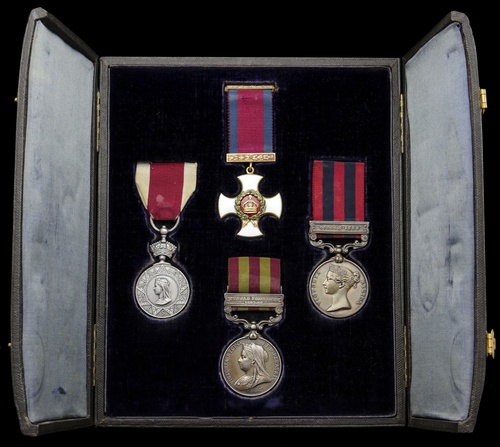Auction: 19002 - Orders, Decorations and Medals
Lot: 364
A very rare 'Sikkim 1888' gold D.S.O. group of four awarded to Surgeon-Colonel R. H. Carew, Royal Army Medical Corps, a well-travelled medic present at the capture of Magdala with the 45th Regiment, who was decorated as the Senior Medical Officer during the Sikkim operations and latterly earned a 'mention' on the North West Frontier of India
Distinguished Service Order, V.R., gold and enamel; Abyssinia 1867-68 (Asst. Surn. R. H. Carew. H.M. 45th Regt); India General Service 1854-95, 1 clasp, Sikkim 1888 (Surjn. Major R. H. Carew Medl. Staff); India General Service 1895-1902, 1 clasp, Punjab Frontier 1897-98 (Surjn Coll. R. H. Carew A.M.S.), one or two edge bruises, otherwise nearly extremely fine, housed in a contemporary fitted leather case for display (4)
Just 2 D.S.O.s awarded for the Sikkim expedition.
D.S.O. London Gazette 12 April 1889:
'In recognition of services during operations in Sikkim.'
Richard Hugh Carew was born on 10 August 1841 and was appointed Assistant Staff-Surgeon on 31 March 1865. Attached to the 45th Regiment from 1 May 1867, he joined the Medical Staff and served with the Regiment in the Abyssinia, being present at the capture of Magdala (Medal).
Having gained steady promotion and married at Dublin in 1879, Carew was appointed Senior Medical Officer to the Field Force for the Sikkim expedition of 1888. The upper Himalayan state of Sikkim, which bordered Tibet, had been ceded to the British in 1814. By early 1888 however, the Tibetans had convinced the Rajah to erect a defensive fortress to block trade at Lingtu, which was certainly not in the terms agreed. Despite the Viceroy attempting to dissaude him, a force under the command of Colonel T. Graham, Royal Artillery was dispatched in March 1888. Much of the fighting that was to take place would be done above 20,000ft, a feat only beaten during the Tibet campaign of 1903-04. Having attacked and destroyed the fort on 20 March, the force withdrew to Darjeeling. Then intelligence came of further incursions on the Jelapla Pass. So it was on 25 September that the Force, with Carew in close order, drove the enemy from their positions. At the cost of some 400 Tibetan warriors, they withdrew from Sikkim. Carew would have seen the full effect of the enemy and the conditions upon the force and would surely have offered treatment to Lieutenant-Colonel Sir Benjamin P. Bromhead, Bt, 32nd Bengal Infantry, who was severely wounded on the latter occasion. He duly received his rare award of the D.S.O.
Promoted Lieutenant-Colonel, 7 December 1891 and Colonel, 11 December 1895, Carew took part in the operations on the North-West Frontier of India 1897-98. Serving as Principal Medical Officer with the Tochi Field Force, he earned a 'mention' (London Gazette 11 February 1898, refers) to go with the Medal & clasp. The Colonel died at Sirinagar, Cashmere on 24 September 1902 and is buried there with a gravestone raised by his brother officers.
Subject to 20% VAT on Buyer’s Premium. For more information please view Terms and Conditions for Buyers.
Sold for
£5,800
Starting price
£5800







